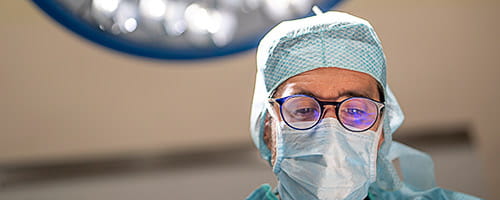University Hospitals Solves Sleep Disorders
Sleep is a critical function for brain and body health. A night of restful sleep allows the brain to store memories and promote mental sharpness and concentration during the day. It also allows the body to burn fat, restore tissue and boost energy and productivity. Yet millions of Americans suffer from lack of sleep.

To schedule an appointment with a pediatric or adult sleep provider, call 216-844-7378.
Long-term sleeplessness and restless sleep can lead to a number of health problems including:
- Cardiovascular risks such as heart disease, high blood pressure and stroke
- Mood disorders such as depression or anxiety
- Mental impairments such as an inability to focus and concentrate
- Metabolic complications such as diabetes or weight gain
Sleep disorder doctors at University Hospitals work hand-in-hand with our pulmonary specialists, heart doctors, ENTs, neurologists and psychologists to evaluate patients’ sleep struggles and restore them to good, solid rest.
Sleep Disorders We Treat
University Hospitals sleep specialists can help you sleep well again. Our sleep team identifies and treats sleep disorders including:
- Cheyne-stokes respiration: This disorder is characterized by abnormal breathing patterns. These patterns may include deep breathing followed by shallow breathing. There may also be a period of sleep apnea in Cheyne-stokes respiration before the cycle begins again.
- Circadian rhythm sleep disorder: Circadian rhythms are regulated by the brain’s response to light during the day and darkness at night. It’s commonly called the “sleep-wake cycle.” Patients unable to fall sleep and wake up following “normal’ patterns may have circadian rhythm sleep disorder.
- Hypersomnia: A person who is not sleep deprived but feels extremely tired and sleepy during the day may be suffering from hypersomnia.
- Insomnia: Trouble falling asleep and/or staying asleep is called insomnia. It can be caused by a variety of issues from asthma and acid reflux to chronic pain and depression.
- Narcolepsy: A genetic disorder that affects the central nervous system, narcolepsy is characterized by overwhelming daytime drowsiness and sleep episodes at inappropriate times.
- Parasomnias: The term parasomnia covers a range of atypical behaviors during sleep. These behaviors include night terrors, sleep walking, sleep paralysis and more. Some people may have a combination of a parasomnia with another sleep disorder such as apnea.
- REM sleep behavioral disorder: A normal sleep cycle transitions through three phases: wakefulness, rapid eye movement (REM) which is associated with dreaming and non-rapid eye movement (N-REM). People who act out (talking, shouting, kicking, punching) during the REM cycle are said to have REM sleep behavioral disorder.
- Restless legs syndrome (RLS): People with RLS tend to move their legs as they fall asleep or while sleeping due to uncontrollable sensations in their limbs such as tingling or pulling.
- Sleep apnea: Lack of airflow during sleep is called sleep apnea. There are two types: central and obstructive. Regardless of the type, it leaves the brain and body oxygen-deprived during sleep.
- Sleep-related hypoxemia: Patients who suffer from chronic lung diseases such as COPD, cystic fibrosis and asthma are often oxygen deprived as they sleep. This is known as hypoxemia.
- Snoring: Noisy breathing - whether as soft as a whistle, as loud as a trumpet or any volume in between - is called snoring. It’s considered a sleep problem when it disrupts your or your partner’s sleep.

Surgical Options to Restore Sleep
In some cases, sleep disorders such as snoring and sleep apnea are best resolved with surgery. University Hospitals’ pulmonologists and otolaryngologists, better known as ENTs are trained to medically and surgically manage and treat patients with conditions that contribute to sleeplessness.
Our specialists perform surgery for snoring and sleep apnea, including the new INSPIRE therapy. INSPIRE involves surgically implanting a small device, similar to a pacemaker, which stimulates the nerves of the airway muscles to keep the airways open during sleep.

Pediatric Sleep Services
Our board-certified pediatric sleep experts at University Hospitals Rainbow Babies & Children’s Hospital have set the national standards for child- and adolescent-friendly sleep studies and treatment protocols.


